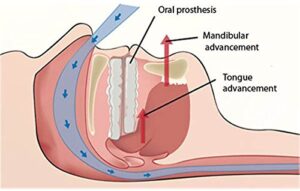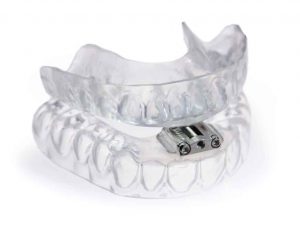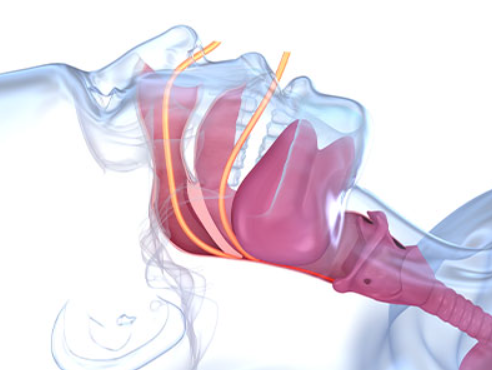
Many people are unaware of the significant connection between sleep apnea and dental health. As your trusted dentist in Rockville, MD, we at Rockville Dental Arts believe it’s crucial to educate our patients about this important link. As your trusted dentist in Rockville MD, understanding how sleep apnea affects your oral health can lead to better overall well-being and improved quality of life.
What is Sleep Apnea?
Sleep apnea is a serious sleep disorder characterized by repeated interruptions in breathing during sleep. These pauses can last from a few seconds to minutes and may occur 30 times or more per hour. The most common type is obstructive sleep apnea (OSA), where the airway becomes blocked or collapses during sleep.
The Dental-Sleep Apnea Connection
Your mouth can provide valuable clues about sleep apnea. As dentists, we’re often the first healthcare professionals to notice signs of this condition. Here are some ways sleep apnea and dental health are interconnected:
- Bruxism (Teeth Grinding)

Many people with sleep apnea unknowingly grind their teeth at night. This grinding, known as bruxism, can lead to worn-down teeth, facial pain, and temporomandibular joint (TMJ) disorders. If we notice signs of excessive wear on your teeth, it might be an indicator of sleep apnea.
- Dry Mouth
Sleep apnea often causes mouth breathing, which can result in chronic dry mouth. A lack of saliva increases the risk of tooth decay, gum disease, and bad breath. If you consistently wake up with a dry mouth, it could be a sign of sleep apnea.
- Gum Disease
Research has shown a correlation between sleep apnea and periodontal disease. The intermittent drops in blood oxygen levels associated with sleep apnea can increase inflammation throughout the body, including in the gums. This inflammation makes you more susceptible to gum disease.
- Tooth Loss
The combination of dry mouth, increased risk of gum disease, and potential teeth grinding can lead to premature tooth loss in sleep apnea patients if left untreated.
- Craniofacial Abnormalities
Certain dental and facial characteristics can predispose individuals to sleep apnea. These include a small jaw, large tongue, or narrow airway. As your dentist, we can identify these risk factors during routine examinations.
How Dentists Can Help with Sleep Apnea
At Rockville Dental Arts, we play a crucial role in identifying and treating sleep apnea:
- Screening and Referral
During regular check-ups, we can screen for signs of sleep apnea and refer you to a sleep specialist for a definitive diagnosis if necessary.
For mild to moderate cases of sleep apnea, we can create custom-fitted oral appliances. These devices help keep your airway open during sleep by repositioning your jaw or tongue.
- Treating Related Dental Issues
We can address dental problems associated with sleep apnea, such as treating gum disease or repairing worn teeth.
- Education and Prevention
We provide valuable information about sleep apnea, its effects on oral health, and preventive measures you can take.
Importance of Treating Sleep Apnea
Addressing sleep apnea is crucial not only for your dental health but also for your overall well-being. Untreated sleep apnea can lead to:
– Increased risk of heart disease, stroke, and high blood pressure
– Daytime fatigue and decreased productivity
– Mood disorders and irritability
– Impaired cognitive function
– Increased risk of accidents due to drowsiness
Steps to Take If You Suspect Sleep Apnea
If you’re experiencing symptoms of sleep apnea, such as loud snoring, gasping for air during sleep, or excessive daytime sleepiness, it’s important to take action:
- Schedule a dental check-up: At Rockville Dental Arts, we can examine your mouth for signs of sleep apnea and discuss your symptoms.
- Keep a sleep diary: Record your sleep patterns, including any disturbances or daytime symptoms.
- Consider a sleep study: We can refer you to a sleep specialist who can conduct a comprehensive sleep study to diagnose sleep apnea definitively.
- Explore treatment options: Depending on the severity of your condition, treatment may include lifestyle changes, oral appliances, or continuous positive airway pressure (CPAP) therapy.
Preventing Sleep Apnea-Related Dental Issues
While not all cases of sleep apnea can be prevented, you can take steps to minimize its impact on your dental health:
– Maintain good oral hygiene to prevent gum disease
– Use a humidifier to combat dry mouth
– Wear a night guard if you grind your teeth
– Stay hydrated throughout the day
– Avoid alcohol and sedatives before bed, as they can relax throat muscles
Conclusion
The connection between sleep apnea and dental health is significant and often overlooked. As your dentist in Rockville, MD, we at Rockville Dental Arts are committed to helping you maintain not just a healthy smile, but also overall well-being. Regular dental check-ups can play a crucial role in identifying and managing sleep apnea.
If you’re concerned about sleep apnea or its effects on your oral health, don’t hesitate to reach out to us. Together, we can work towards better sleep, improved dental health, and enhanced quality of life. Remember, a healthy mouth contributes to a healthy body, and addressing sleep apnea is an important step in achieving both.


